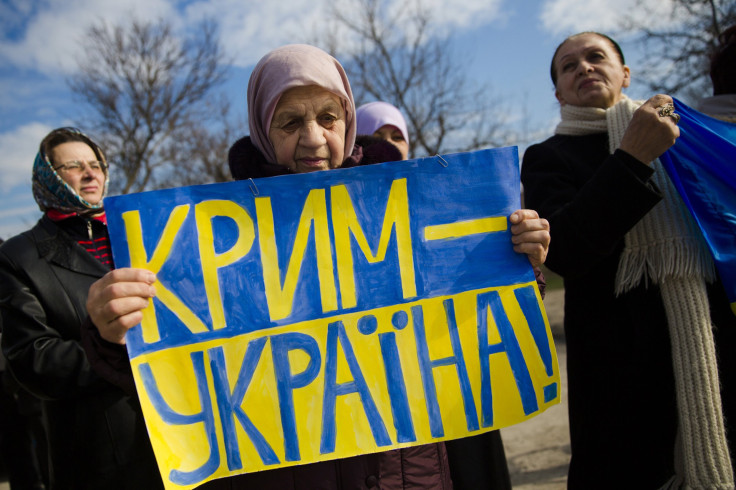Angered After Ethnic Turk's Killing In Crimea, Turkey Warns Against Provocations

In response to the killing of an ethnic Turk in Crimea, Turkey has warned “officials” against further provocations against the Tatar minority on the peninsula now under the control of Russia.
On March 3, Reshat Ametov, who was in his 30s, disappeared when three men in military uniforms detained him during protests in the Crimean capital of Simferopol. Ametov’s body was found two weeks later, naked and showing signs of torture and beating, according to Hurriyet Daily, a Turkish newspaper. He was buried Tuesday.
The murder sparked outrage in Turkey and instilled fear among the Crimean Tatars, a Muslim minority related to the Turks, who are mostly opposed to Russia’s annexation of Crimea. Crimea is divided between two minorities, Tatars and ethnic Ukrainians, and an ethnic Russian majority.
The Tartars have a long and arduous history on the peninsula. They ruled the land under Ottoman Turkish overlordship until the Russian takeover in the 18th century. In 1944 Soviet dictator Joseph Stalin deported the entire Tatar community to Kazakhstan, in Central Asia, and Siberia. Many died in the process. It was only in 1989, in the last days of the Soviet Union, that a large number of Tatars was allowed to return to Crimea.
“Crimean Turk-Tatars who were able to return to their homeland after suffering huge grievances in history have been voicing their views and demands on peaceful grounds,” Turkey’s Foreign Ministry said Wednesday in a statement. “We find it unacceptable that our kin have been exposed to pressure and threats during ‘the referendum’ process and afterwards and have even been deprived of safety despite their responsible attitude.”
But, while Turkey does not recognize the referendum that resulted in 97 percent of Crimean voters demanding annexation to Russia, it still shares a strategic partnership with Moscow. Much of Turkey’s foreign policy toward Moscow is influenced by dependence on Russian natural gas, which accounts for about 55 percent of Turkey’s gas imports.
Besides being a huge exporter of hydrocarbons to Turkey, Russia is its second-biggest trading partner after Germany, according to the Turkish Foreign Ministry.
“[Turkish Prime Minister Recep Tayyip] Erdogan has shied away from picking a fight with [Russian President Vladimir] Putin, knowing that his country's economic growth and his political fortunes depend on his ability to maintain a steady supply of Russian gas and oil,” said Soner Cagaptay of the Washington Institute for Near East Policy, a think tank.
But trade aside, the relationship between the two countries is complex and dates back centuries, from the days of the Ottoman and Russian empires. From 1568 to 1917, Turks and Russians fought around 17 wars, according to Cagaptay. The territorial losses, including Crimea, have “ingrained fear of Russians” into Turks, a major reason behind Turkey's decision to join NATO in 1952.
The killing of Ametov risks opening up a new chapter of that history of distrust and violence, especially as many Tatars (whom the Turks call Turk-Tatars) have been reported to be fleeing the peninsula.
“We reiterate our expectation that provocations that would further complicate the current troubled situation in Crimea should not be given rise,” the ministry said. “We will continue closely watching for the serenity, welfare and security of Crimea Turk-Tatars.”
© Copyright IBTimes 2024. All rights reserved.






















